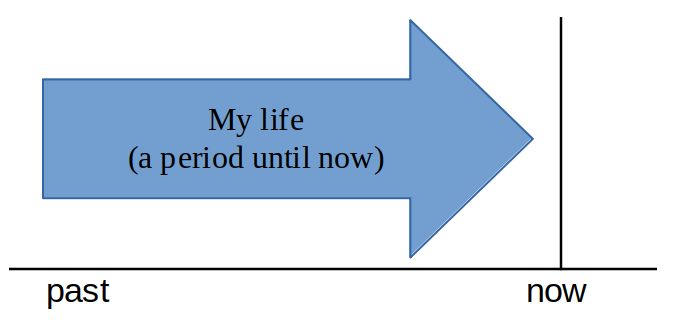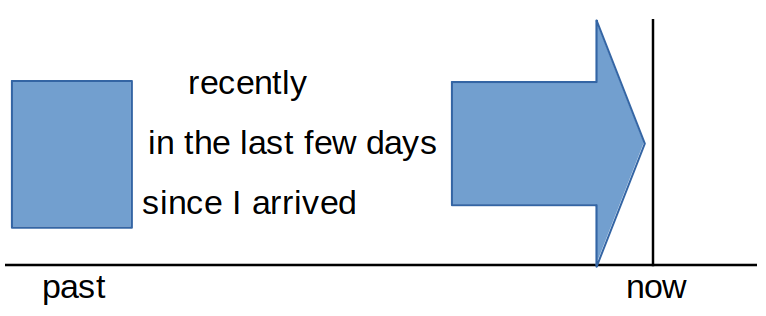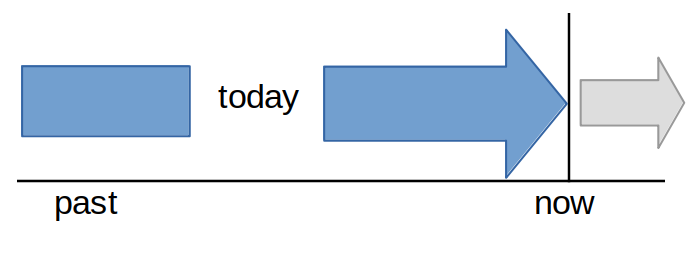PresentPerfect_2
PresentPerfect_2
2021-06-29
PresentPerfect_2
今回は現在完了形についてPart2です。
Part1は以下から飛べます。
2021-06-28
- Read More
PresentPerfect
現在完了形のつかいどころについて_2
-
When we talk about a period of time that contiues from the past until now, we use the present perfect(have benn / have travelled etc.).
→過去から今まで続いてることについて話すときに現在完了形を使います。会話式例文
Friend : Have you travelled a lot?
Me : Yes, I've benn to lots of places.
Friend : Really? Have you been to Italy?
Me : Yes, I've been to Italy twice.
Friend : What about India?
Me : No, I haven't beento India.
↓日本語訳
Friend : (今まで)たくさん旅行したことある?
Me :うん、たくさんの場所行ったよ(訪れたよ)。
Friend :ほんと?イタリアにいったことある?
Me :うん、2回行ったことあるよ。
Friend :インドはどうだった?
Me :インドには行ったことないっす。
Here,friend and I are talking about the places I have visited in my life, which is a period that continues until now
→上記の会話式例文では、私が今までの人生で訪れた場所について会話しています。
benn (to) = visited
例文
I've never been to Canada. Have you been there?
→私はカナダに訪れたことがありません。あなたはありますか?(そこに訪れたことありますか?)
付け加える単語について
-
In the following example too, the speakers are talking about a period that continues until now(recently, in the last few days, so far, since arrived etc.)
→「recently, in the last few days, so far, since arrived」などは現在完了形に付け加えたりします。例文
-
Have you heard anything from Ben recently?
→最近、Benから何か聞きましたか? -
We haven't seen each other for a long time.
→私たちは、(お互いに)長い間見ていない(会っていない)。 -
The weather is bad here.It's(has) rained every day since I arrived.
→ここは天気が悪いです。私が到着してから毎日雨降っていました。

In the same way we use the present perfect with today, this evening, this year etc. when these periods are not finished at the time of speaking.
→today, this evening, this yearなども使うことができます。でもこれらは今以降も続く表現です。
例文
-
I've drunk four cups of coffee today.
→私は今日、4杯のコーヒーを飲みました。(今日というのはまだ終わっていない状況です。) -
Have you had a holiday this year?
→今年に休暇取りましたか?
-
(初めての)出来事の時について(体験ごと)
-
We say 'It's hte (first) time something has happened'.
→(初めての)出来事(体験)のときは、現在完了形を使います。現在形ではないことに注意してください。例文
-
It's the first time he has driven a" car.
→彼は車を運転するのが初めてです。
orHe hasn't driven a car before.
orHe has never driven a car before.
→彼はこれまで(以前)車の運転をしたことがありません。
notIt's the first time he drives a car.
→NG : 出来事や体験のときは現在形ではないです。 -
She has lost her passport again. This is the second time this has happened.
→彼女はまたパスポートを無くしました。これは2回目の出来事です。
-
今日の英単語10選
※英単語をクリックすると日本語訳が表示されます
最後まで見ていただき、ありがとうございます。
トップページなどをブックマークに登録していただいて、
毎日このブログに訪れていただけると嬉しいです
「他の記事も見てみようかな〜」という方は下のリンクでブログ一覧に戻れます。